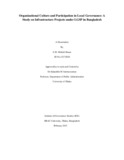| dc.contributor.advisor | Aminuzzaman, Salahuddin M. | |
| dc.contributor.author | Hasan, S.M. Mehedi | |
| dc.date.accessioned | 2014-08-31T06:04:39Z | |
| dc.date.available | 2014-08-31T06:04:39Z | |
| dc.date.copyright | 2013 | |
| dc.date.issued | 2013-02-22 | |
| dc.identifier.other | ID 12172020 | |
| dc.identifier.uri | http://hdl.handle.net/10361/3508 | |
| dc.description | This thesis is submitted in partial fulfillment of the requirements for the degree of Masters of Arts in Governance and Development, 2013. | en_US |
| dc.description | Cataloged from PDF version of thesis. | |
| dc.description | Includes bibliographical references (page 50 - 55). | |
| dc.description.abstract | The study reveals that most of the respondents (53%) do not know the functions of Union
Parishad. Even most of them did not hear about LGSP and its concerned committees as well
as TOR of these committees. So it is unthinkable for them to attend the meetings of the
committees. Participation in project planning is very low. Even those who have knowledge
(23% of total respondents) about LGSP do not participate in the committee meetings. Only
35% of the knowledgeable respondents participated in the committee meetings and of them
only 33% were entertained with opinions. In the implementation phase, participation is also
very low, almost as like as in the planning phase. Only 32% of the knowledgeable
xi
respondents participated in implementation of the projects under LGSP. It has also been
found that participation male respondents are higher than that of the female.
It was taken as a truth that there was centralized control over decision making of UP as a
politico- organizational culture especially by the local MP or other political elites. But, in
case LGSP, neither most of UP members nor of the mass are with the notion. This is, in truth,
a good sign of improving quality of participation in decision making process in project
planning and implementation.Though there has been change in terms of politicoorganizational
culture of UP, little change has been found in terms of people’s participation.
The reason behind this is supposed to be unawareness of the mass, patron-client relationship
between UP bodies and the mass, manipulation in committee formation with the chosen few
in terms of personal relationship and a hidden paper-based adjustment of balance of payment
of the fund for LGSP. The UP representatives still try to hide information about LGSP and
they are completely reluctant to place Sign Board at each of the project area as per the
guidelines of LGSP and UP manual mentioning amount of money allotted for. Amazingly,
not a single sign-board was found among the five projects and being inquired about it the
representatives came with common answers that those were broken up or stolen away. It
seems to be true that the culture of adjusting election cost through projects’ implementation
still affects the participation of common people in project planning and implementation under
LGSP. Most of the UP representatives appreciated the local political elites. It leaves a room
for doubt that they, with the aid of ignorance of the common people, bring the most socially
and politically influential people in manipulating participation. This long existing unholy
alliance between the UP representatives and local elites seems still to be practiced in case of
LGSP. This culture of UP is persisting as common do not understand or never try to
understand the nitty-gritty of project management.
Major policy initiatives are required to avert the situation. Along with bringing transparency
in the whole process, improving literacy rate, imparting training to UP members, raising
awareness among the beneficiaries through GO, NGOs, print and electronic media are of
great significance. Evaluation of the projects must also be done by both competent public and
private project teams. | en_US |
| dc.description.statementofresponsibility | S.M. Mehedi Hasan | |
| dc.format.extent | 81 pages | |
| dc.language.iso | en | en_US |
| dc.publisher | BRAC University | en_US |
| dc.subject | Governance and development | en_US |
| dc.subject | Local governance | en_US |
| dc.subject | Local government | en_US |
| dc.subject | Union parishad | en_US |
| dc.title | Organizational culture and participation in local governance: a study on infrastructure projects under LGSP in Bangladesh | en_US |
| dc.type | Thesis | en_US |
| dc.contributor.department | Institute of Governance Studies, BRAC University | |
| dc.description.degree | M. Governance and Development | |

